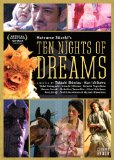| Reviews & Columns |
|
Reviews DVD TV on DVD Blu-ray 4K UHD International DVDs In Theaters Reviews by Studio Video Games Features Collector Series DVDs Easter Egg Database Interviews DVD Talk Radio Feature Articles Columns Anime Talk DVD Savant Horror DVDs The M.O.D. Squad Art House HD Talk Silent DVD
|
DVD Talk Forum |
|
|
| Resources |
|
DVD Price Search Customer Service #'s RCE Info Links |
|
Columns
|
|
|
Ten Nights of Dreams
Cinema Epoch // Unrated // October 14, 2008
List Price: $24.98 [Buy now and save at Amazon]
Dream interpretation has existed in cultures ranging as far back as Grecian and Egyptian times, but it's only within the past 100 or so years that it has become a psychological science through efforts from Sigmund Freud, Carl Jung, and the likes. With that rise of "popularity" has come a comfort in sharing one's dreams openly, though Japanese novelist Natsumi Soseki embodied this idea with seemingly little knowledge of its modernizing concepts when he composed his "Ten Nights of Dreams" short story series in 1908. Marking the 100th Anniversary of his writings, filmmakers ranging greatly in style and experience have gathered together to direct ten distinct short films in honor of his stories. Some are down to earth and seemingly literal interpretations of Soseki's dreams, while others fly way off the handle into the odd realm of lavish comedy horror. Ten Nights of Dreams becomes a compelling mosaic of Japanese filmmakers and their journeys into the unexplainable world of dreams.
The Film:

Largely similar to the structure and rhythm of Akira Kurosawa's Dreams, this assembly project takes its audience through a nonsensical, mind-blowing trip through a series of flashes from the mind of Natsumi Soseki. It features a few fictional scenes of the novelist as he jots his works down to establish some form of time flow -- which works to the film's advantage -- but ultimately there are little to no connective themes across most of his tales, outside of the touch-and-go presence of Soseki himself in his dreams. Many of them focus on demons from the past, but that's an element that arise in a lot of people's dreams. The negative things we experience in the past, whether we've consciously forgotten about them, still linger in the shadows of our subconscious. That's where Ten Nights of Dreams earns its effectiveness.
But instead of a unification of style a la Kurosawa's dream analysis, Ten Nights of Dreams instead feels like a cluster of individual ten-minute vignettes composed by the collective conscience of Japanese horror as a living, breathing entity. The material ranges from the relatively tame and literal, such as Kon Ichikawa's silent-era take on seppuku (suicide) in the Second Night or Takashi Shimizu's Soseki-focused child mystery in the Third Night, to the other-worldly and bizarre expanses of the genre, like with the Final-Fantasy style anime work on the Seventh Night and the outlandish Sweeney Todd-esque swine murderers in the Tenth Night.
Experiencing this scrapbook of odd dreams builds an unnerving, discomforting atmosphere, much like listening in on somebody's troubling nightmares in a psych session. Dream analysis leaves a lot up to interpretation, which is an experience that should be left to the viewer in Ten Nights of Dreams's logic-shattering composition. Whether enjoyment or not can be found in the film is also subjective -- but personally I relished in the haunting, strange atmosphere much in the way one does while listening to a barrage of spooky ghost tales told around a campfire. Some of the stories are much better than the others, but each bizarre entry brings something to the table in creating a genuinely rattling experience.
There are a few strong ideas to take away from some of the dreams: for instance, in the Fifth Night of Dreams, the paramount entity invoking fear is a snarling, bandage-wrapped woman who follows the female protagonist everywhere she goes. That visage, as it becomes stronger and stronger with the flow of the dream, starts to reflect the wounds of disaster that haunt her everywhere she goes -- no matter how hard she tries to run away from them (emphasized by intense horse-rising in the film). As the dream world and real world blur, the themes intensify once more monsters start to lurk into the picture.
Also, in the zany Sixth Night, we watch a break dancer size up a wooden stump and "carve" (read: materialize) an idol-like statue with one swift shot of an axe. Many onlookers watch as this mysterious, speechless entity conducts his ritual, especially an impressionable younger adult boy. When he returns home and tries to mimic the mysterious carver's moves concluding in a blast on a chunk of wood, he obtains a surprising result; however, it's not to the scale of the celebrity-like character, so he instantly dismisses it as "not good". This, along with the film's setting in a dusty, timeless environment that seems almost post-apocalyptic, it analyzes the themes of mirroring ourselves into the ideals of celebrities -- or even deities -- and being dissatisfied with our results in life, even if they're strong efforts in their own right.
Granted, not all of Ten Nights of Dreams is that thoughtful. However, to overwhelm the viewer, or reader in Soseki's writing standpoint, would cobble together too many ideas to process in pseudo-philosophical fashion. Instead, the final result stitches together thought with anarchy, subtlety with blatancy, and lurid intensity with smooth, careful intricacy into an eerie and shiver-inducing trip into grotesquery. Moreover, it highlights an interesting paradigm: dream interpretation with directorial renditions of Soseki's dreams. If the idea of combining Akira Kurosawa's Dreams together with anime, comical and not-so-comical prop horror, and troubling psychological material sounds appealing, then Ten Nights of Dreams is right up your alley.
The DVD:
Cinema Epoch brings the Ten Nights of Dreams to DVD in a standard keepcase presentation, sporting artwork that captures many of the memorable characters from the shorts in an almost "group photo".
The Video:
As hard to quantify as feeling on the film as a whole, this 1.85:1 transfer contains many different film styles, stocks, concentration on detail, everything. The key thing to note here is that the transfer appears interlaced, which renders some ghosting in faster-moving scenes -- especially noticeable during the Sixth Night when the break dancer moves about -- and exhibits a bit of aliasing along the edges. Probably because of the quality of the source, these elements don't look all that bad. Beyond that, the portions that exhibit a lot of detail, such as the numerous bandages and stitches on the monster in the Fifth Night and the slimy textures and such on the worm in the Eighth Night, all shine through with plenty of strength. Darker scenes tend to have a noisy, grayish appearance to them at times, but nothing too detrimental.
The Audio:
The Japanese Dolby 2.0 Stereo track (along with English during the Seventh Night) comes mixed at a pretty high level, providing a lot of clarity amid its rather noisy properties. Vocal clarity and pitched sound effects rang through in a suitable manner, though the dynamics of the track could've been heightened a bit. Subtitles are only available in English, while one or two have burnt-in English subs (like #6).
The Extras:
Essay by Japanese Film Critic Nicholas Rucka:
Rucka's essay covers more than just the Ten Nights of Dreams -- it covers a multitude of topics that surround the 100th Anniversary of Soseki's work. His material spans from discussing on the Japanese Omnibus film as a whole, discussion on Suseki himself, and the written work that the film is based on. It's a good read that enlightens more on the history behind the writer and the stories than the film itself.
Also included are a Japanese Trailer, a Teaser Trailer, and a TV Spot -- all presented in non-anamorphic and/or fullscreen presentations -- along with a nice Stills Gallery that shows off all the film's great range of photography.
-----
Final Thoughts:
Though it's not quite as substantial or thought-provoking as Kurosawa's analysis on dreams, Ten Nights of Dreams portrays Natsumi Soseki's short shories in a similarly hazy, dream-like collection of ten very distinct works of short cinema. Ranging from the talents of legends Ichikawa and Shimizi to a range of relatively unknown directors, it blends together simple dramatic projection and absolutely chaotic filmmaking into one package that, though not cohesive, embodies a Recommended full gamut in ranged Japanese dramatic horror that's well worth seeing.
Thomas Spurlin, Staff Reviewer -- DVDTalk Reviews | Personal Blog/Site
The Film:

Largely similar to the structure and rhythm of Akira Kurosawa's Dreams, this assembly project takes its audience through a nonsensical, mind-blowing trip through a series of flashes from the mind of Natsumi Soseki. It features a few fictional scenes of the novelist as he jots his works down to establish some form of time flow -- which works to the film's advantage -- but ultimately there are little to no connective themes across most of his tales, outside of the touch-and-go presence of Soseki himself in his dreams. Many of them focus on demons from the past, but that's an element that arise in a lot of people's dreams. The negative things we experience in the past, whether we've consciously forgotten about them, still linger in the shadows of our subconscious. That's where Ten Nights of Dreams earns its effectiveness.
But instead of a unification of style a la Kurosawa's dream analysis, Ten Nights of Dreams instead feels like a cluster of individual ten-minute vignettes composed by the collective conscience of Japanese horror as a living, breathing entity. The material ranges from the relatively tame and literal, such as Kon Ichikawa's silent-era take on seppuku (suicide) in the Second Night or Takashi Shimizu's Soseki-focused child mystery in the Third Night, to the other-worldly and bizarre expanses of the genre, like with the Final-Fantasy style anime work on the Seventh Night and the outlandish Sweeney Todd-esque swine murderers in the Tenth Night.
Experiencing this scrapbook of odd dreams builds an unnerving, discomforting atmosphere, much like listening in on somebody's troubling nightmares in a psych session. Dream analysis leaves a lot up to interpretation, which is an experience that should be left to the viewer in Ten Nights of Dreams's logic-shattering composition. Whether enjoyment or not can be found in the film is also subjective -- but personally I relished in the haunting, strange atmosphere much in the way one does while listening to a barrage of spooky ghost tales told around a campfire. Some of the stories are much better than the others, but each bizarre entry brings something to the table in creating a genuinely rattling experience.
There are a few strong ideas to take away from some of the dreams: for instance, in the Fifth Night of Dreams, the paramount entity invoking fear is a snarling, bandage-wrapped woman who follows the female protagonist everywhere she goes. That visage, as it becomes stronger and stronger with the flow of the dream, starts to reflect the wounds of disaster that haunt her everywhere she goes -- no matter how hard she tries to run away from them (emphasized by intense horse-rising in the film). As the dream world and real world blur, the themes intensify once more monsters start to lurk into the picture.
Also, in the zany Sixth Night, we watch a break dancer size up a wooden stump and "carve" (read: materialize) an idol-like statue with one swift shot of an axe. Many onlookers watch as this mysterious, speechless entity conducts his ritual, especially an impressionable younger adult boy. When he returns home and tries to mimic the mysterious carver's moves concluding in a blast on a chunk of wood, he obtains a surprising result; however, it's not to the scale of the celebrity-like character, so he instantly dismisses it as "not good". This, along with the film's setting in a dusty, timeless environment that seems almost post-apocalyptic, it analyzes the themes of mirroring ourselves into the ideals of celebrities -- or even deities -- and being dissatisfied with our results in life, even if they're strong efforts in their own right.
Granted, not all of Ten Nights of Dreams is that thoughtful. However, to overwhelm the viewer, or reader in Soseki's writing standpoint, would cobble together too many ideas to process in pseudo-philosophical fashion. Instead, the final result stitches together thought with anarchy, subtlety with blatancy, and lurid intensity with smooth, careful intricacy into an eerie and shiver-inducing trip into grotesquery. Moreover, it highlights an interesting paradigm: dream interpretation with directorial renditions of Soseki's dreams. If the idea of combining Akira Kurosawa's Dreams together with anime, comical and not-so-comical prop horror, and troubling psychological material sounds appealing, then Ten Nights of Dreams is right up your alley.
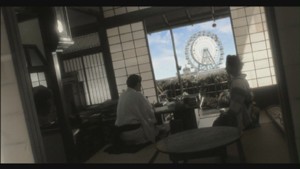 First Night of Dreams Directed by Akio Jissoji 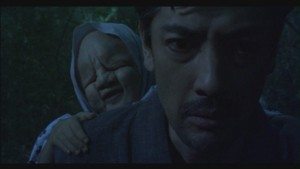 Third Night of Dreams Directed by Takashi Shimizu 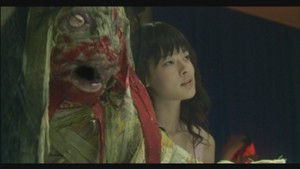 Fifth Night of Dreams Directed by Keisuke Toyoshima 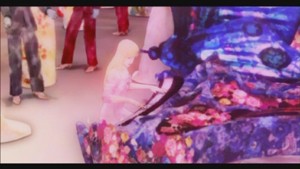 Seventh Night of Dreams Directed by Yoshitaka Amano & Simmei Kawahara 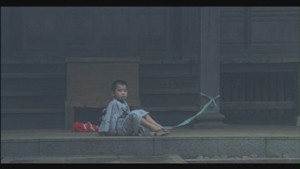 Ninth Night of Dreams Directed by Miwa Nashikawa | 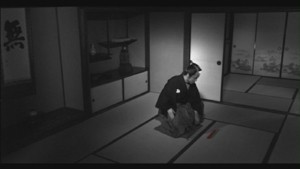 Second Night of Dreams Directed by Kon Ichikawa 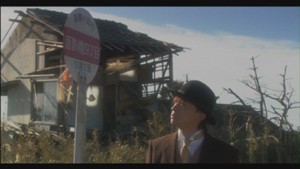 Fourth Night of Dreams Directed by Atsushi Shimizu 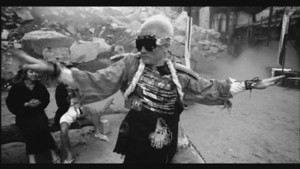 Sixth Night of Dreams Directed by Suzuki Matsuo 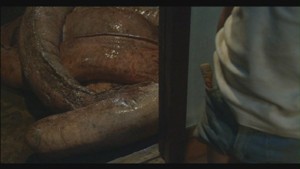 Eighth Night of Dreams Directed by Nobuhiro Yamashita 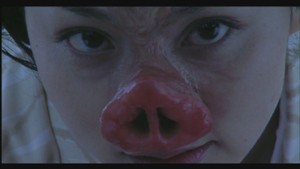 Tenth Night of Dreams Directed by Yudai Yamaguchi |
The DVD:
Cinema Epoch brings the Ten Nights of Dreams to DVD in a standard keepcase presentation, sporting artwork that captures many of the memorable characters from the shorts in an almost "group photo".
The Video:
As hard to quantify as feeling on the film as a whole, this 1.85:1 transfer contains many different film styles, stocks, concentration on detail, everything. The key thing to note here is that the transfer appears interlaced, which renders some ghosting in faster-moving scenes -- especially noticeable during the Sixth Night when the break dancer moves about -- and exhibits a bit of aliasing along the edges. Probably because of the quality of the source, these elements don't look all that bad. Beyond that, the portions that exhibit a lot of detail, such as the numerous bandages and stitches on the monster in the Fifth Night and the slimy textures and such on the worm in the Eighth Night, all shine through with plenty of strength. Darker scenes tend to have a noisy, grayish appearance to them at times, but nothing too detrimental.
The Audio:
The Japanese Dolby 2.0 Stereo track (along with English during the Seventh Night) comes mixed at a pretty high level, providing a lot of clarity amid its rather noisy properties. Vocal clarity and pitched sound effects rang through in a suitable manner, though the dynamics of the track could've been heightened a bit. Subtitles are only available in English, while one or two have burnt-in English subs (like #6).
The Extras:
Essay by Japanese Film Critic Nicholas Rucka:
Rucka's essay covers more than just the Ten Nights of Dreams -- it covers a multitude of topics that surround the 100th Anniversary of Soseki's work. His material spans from discussing on the Japanese Omnibus film as a whole, discussion on Suseki himself, and the written work that the film is based on. It's a good read that enlightens more on the history behind the writer and the stories than the film itself.
Also included are a Japanese Trailer, a Teaser Trailer, and a TV Spot -- all presented in non-anamorphic and/or fullscreen presentations -- along with a nice Stills Gallery that shows off all the film's great range of photography.
-----
Final Thoughts:
Though it's not quite as substantial or thought-provoking as Kurosawa's analysis on dreams, Ten Nights of Dreams portrays Natsumi Soseki's short shories in a similarly hazy, dream-like collection of ten very distinct works of short cinema. Ranging from the talents of legends Ichikawa and Shimizi to a range of relatively unknown directors, it blends together simple dramatic projection and absolutely chaotic filmmaking into one package that, though not cohesive, embodies a Recommended full gamut in ranged Japanese dramatic horror that's well worth seeing.
|
| Popular Reviews |
| Sponsored Links |
|
|
| Sponsored Links |
|
|
| Release List | Reviews | Shop | Newsletter | Forum | DVD Giveaways | Blu-Ray | Advertise |
|
Copyright 2024 DVDTalk.com All Rights Reserved. Legal Info, Privacy Policy, Terms of Use,
Manage Preferences,
Your Privacy Choices | |||||||









